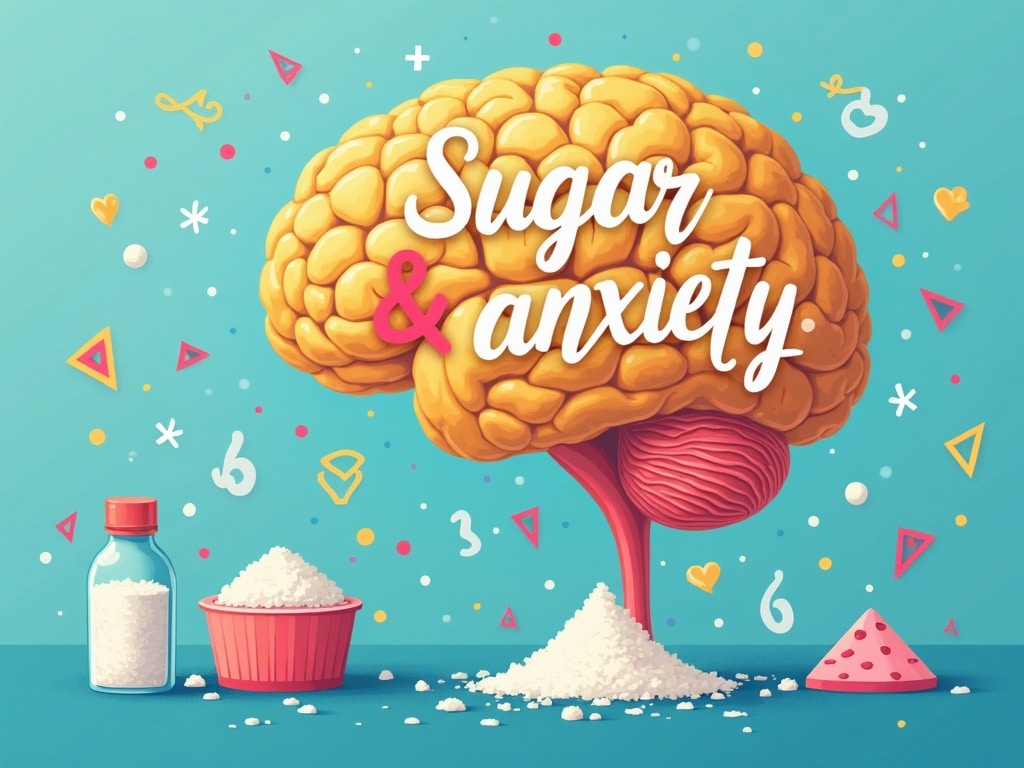The Troubling Link Between Sugar and Anxiety: What You Need to Know
Have you ever noticed that your anxiety seems to spike after indulging in a sugary treat? That jittery feeling isn't just a coincidence. The connection between sugar and anxiety is complex and often overlooked, but understanding it is crucial for managing your mental wellness. This article dives deep into the science behind this relationship, offering insights and practical strategies to help you navigate the sugary landscape and reclaim your calm.
The Sugar Rush and Crash: A Biochemical Rollercoaster
The immediate effects of sugar consumption are well-known: a quick burst of energy and a temporary mood lift. This sugar rush is caused by a rapid increase in blood glucose levels, triggering the release of dopamine, a neurotransmitter associated with pleasure and reward. However, this fleeting euphoria is followed by an inevitable sugar crash, a rapid drop in blood glucose that can leave you feeling tired, irritable, and, yes, anxious.
This rollercoaster effect isn't just about feeling temporarily down. The constant fluctuations in blood sugar can wreak havoc on your body's stress response system. When blood sugar plummets, the body releases cortisol and adrenaline, the same hormones activated during a fight-or-flight response. Over time, this chronic activation of the stress response can exacerbate anxiety and even contribute to the development of anxiety disorders.
How Sugar Impacts Neurotransmitters
Beyond the immediate rush and crash, sugar also affects the delicate balance of neurotransmitters in the brain. Serotonin, often dubbed the feel-good neurotransmitter, plays a key role in regulating mood, sleep, and appetite. While sugar can temporarily increase serotonin levels, this is followed by a decrease, potentially worsening feelings of anxiety and depression.
Furthermore, excessive sugar consumption can interfere with the production and function of GABA (gamma-aminobutyric acid), an inhibitory neurotransmitter that helps calm the nervous system. Low GABA levels are associated with increased anxiety, panic attacks, and insomnia. In essence, sugar can disrupt the very neurochemical processes that help keep anxiety at bay.
Inflammation: The Silent Contributor to Anxiety
Emerging research highlights the role of inflammation in mental health disorders, including anxiety. Sugar, particularly refined sugar and processed foods, is a known inflammatory agent. It can trigger the release of inflammatory cytokines, which are signaling molecules that can cross the blood-brain barrier and directly affect brain function.
Chronic inflammation in the brain can disrupt neuronal communication, impair neurotransmitter function, and increase the risk of neurodegenerative diseases. While the link between inflammation and anxiety is still being investigated, it's becoming increasingly clear that reducing inflammation through diet can have a positive impact on mental well-being. Cutting back on sugary foods is a crucial step in achieving this.
The Gut-Brain Axis: Sugar's Impact on Your Second Brain
The gut-brain axis is a complex communication network that connects the digestive system and the brain. The gut microbiome, the trillions of bacteria that reside in your gut, plays a vital role in this communication. Studies have shown that gut bacteria can influence brain function, mood, and behavior.
A diet high in sugar can disrupt the balance of gut bacteria, leading to dysbiosis, an imbalance that favors harmful bacteria over beneficial ones. This imbalance can contribute to inflammation, impair nutrient absorption, and affect the production of neurotransmitters like serotonin. Research suggests that restoring gut health through dietary changes, including reducing sugar intake, can alleviate anxiety symptoms.

Hidden Sugars: Unmasking the Culprits
It's not just the obvious sugary culprits like candy and soda that contribute to the problem. Sugar is often hidden in processed foods, sauces, and even seemingly healthy snacks. Learning to identify these hidden sugars is essential for managing your intake and reducing your risk of anxiety-related issues.
Decoding Food Labels
Become a savvy label reader. Pay close attention to the added sugars listed on the nutrition facts panel. Also, be aware of the many different names for sugar, including:
- High fructose corn syrup
- Sucrose
- Glucose
- Fructose
- Dextrose
- Maltose
- Corn syrup
- Agave nectar
- Honey
- Molasses
The higher these ingredients are on the list, the more sugar the product contains. Opt for foods with minimal added sugars and focus on whole, unprocessed options.
Sneaky Sources of Sugar
Be mindful of these surprising sources of added sugar:
- Sauces and Dressings: Ketchup, barbecue sauce, salad dressings, and marinades can be loaded with sugar.
- Processed Snacks: Granola bars, flavored yogurts, and packaged cereals often contain significant amounts of added sugar.
- Drinks: Juices, sweetened teas, and sports drinks can be major sources of hidden sugar.
- Bread: Some breads, especially white bread, contain added sugars.
Choosing unsweetened alternatives and preparing your own meals can help you control your sugar intake and avoid these hidden sources.
Practical Strategies for Reducing Sugar Intake and Managing Anxiety
Cutting back on sugar can feel challenging, but it's a worthwhile investment in your mental and physical well-being. Here are some practical strategies to help you reduce your sugar intake and manage anxiety:
Start Gradually
Drastic changes can be overwhelming and unsustainable. Begin by making small, gradual changes to your diet. For example, swap sugary sodas for water or unsweetened tea. Reduce the amount of sugar you add to your coffee or cereal. Over time, these small changes will add up to significant reductions in your overall sugar intake.
Focus on Whole Foods
Prioritize whole, unprocessed foods like fruits, vegetables, lean proteins, and whole grains. These foods are naturally low in sugar and packed with nutrients that support both physical and mental health.
Read Labels Carefully
Make it a habit to read food labels before you buy anything. Be aware of the different names for sugar and choose products with the lowest amounts of added sugar. This simple step can make a big difference in your overall sugar consumption.
Plan Your Meals and Snacks
Planning your meals and snacks ahead of time can help you avoid impulsive decisions that lead to sugary treats. Pack healthy snacks like fruits, vegetables, nuts, or yogurt to keep you satisfied and prevent cravings.
Find Healthy Sugar Alternatives
If you have a sweet tooth, explore healthy sugar alternatives like stevia, erythritol, or monk fruit. These natural sweeteners have minimal impact on blood sugar levels and can help you satisfy your cravings without the negative effects of sugar.
Manage Stress Effectively
Stress can trigger cravings for sugary foods. Find healthy ways to manage stress, such as exercise, yoga, meditation, or spending time in nature. These activities can help regulate your mood and reduce your reliance on sugar for comfort.
Seek Professional Support
If you're struggling to reduce your sugar intake or manage your anxiety, consider seeking professional support from a registered dietitian or a mental health professional. They can provide personalized guidance and support to help you achieve your goals.
The Long-Term Benefits of a Low-Sugar Lifestyle
The benefits of reducing sugar intake extend far beyond just managing anxiety. A low-sugar lifestyle can improve your overall health and well-being in numerous ways, including:
- Improved Mood: By stabilizing blood sugar levels and supporting neurotransmitter function, reducing sugar can lead to a more stable and positive mood.
- Increased Energy Levels: Eliminating sugar crashes can result in more sustained energy throughout the day.
- Better Sleep: Reducing sugar intake, especially before bed, can improve sleep quality.
- Weight Management: Sugar is a major contributor to weight gain. Reducing your intake can help you maintain a healthy weight.
- Reduced Risk of Chronic Diseases: A low-sugar lifestyle can lower your risk of chronic diseases like type 2 diabetes, heart disease, and certain types of cancer.
The journey to a low-sugar lifestyle may require effort and commitment, but the rewards are well worth it. By understanding the link between sugar and anxiety and implementing practical strategies to reduce your intake, you can take control of your mental well-being and create a healthier, happier life.
Listen to Your Body
Ultimately, the best approach is to listen to your body and pay attention to how different foods affect your mood and anxiety levels. Experiment with reducing sugar and see how it impacts your overall well-being. It may take some time to adjust, but the long-term benefits of a lower-sugar lifestyle are undeniable. Embrace the journey, be patient with yourself, and celebrate your progress along the way. Your mental and physical health will thank you for it.

